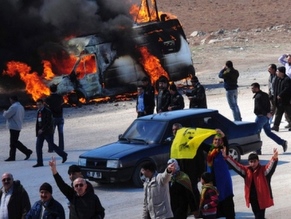|
World Jewish News

Demonstrators, holding a portrait of jailed Kurdistan Workers Party (PKK) leader Abdullah Ocalan, walk past a burning mobile telephone relay station in Diyarbakir, southeastern Turkey, March 18, 2012. Photo by: Reuters
|
Turkey blames Syria for supporting Kurdish rebels, inches closer to military action
23.03.2012, Israel and the World Will the Kurdistan Workers' Party (PKK) drag Turkey into a war in Syria? The Turkish media has emphasized the declaration by the PKK's de facto leader Murat Karayilan that "If Turkey intervenes against our people inwestern Kurdistan, the area will turn into a battlezone."
Western Kurdistan is the name the Kurds call eastern Syria, inhabited by more than two million Kurds. Turkey now blames Syria for using the PKK as an additional arm, allowing members of the organization to roam freely in its territory with weapons and permitting them to carry out terror acts in Turkish territory. Should Turkey decide that the operations of PKK members threaten its national security, it may decide to invade Syria under the justification of preventing terror, rather than aiding the rebels against Assad's crackdown. Such a decision could become the turning point the Syrian rebels are hoping for – a foreign military intervention in their country.
Turkey and Syria stood on the brink of a military crisis in 1998, when Turkish forces – including tanks – were deployed on the border with Syria and threatened to invade the country. In light of that threat, Syrian President Hafez Assad (Bashar's father) decided to distance the country from the PKK and stop any assistance, thus diminishing the chances of a war.
Turkey now supports the establishment of security zones for Syrian refugees inside Syrian territory, yet it is refraining from doing so on its own without an international umbrella that will allow entry of foreign troops to these zones. At the same time, Turkey has declared in recent weeks that it may have to act on its own if the Syrian uprising threatens its national security. Freedom of movement and operation of PKK operatives in Syria might serve as a Casus belli, especially since the Turkish military is currently engaged in heavy fighting with Kurdish rebels within its own borders.
The Kurdish area in Syria has so far been relatively quiet, particularly after Bashar Assad decided to grant a few hundred thousand Kurds with Syrian citizenships, denied for decades. Nevertheless, the Kurds created their own anti-Assad front after being pushed aside by the Syrian National Council, the large opposition body operating outside of the country. Turkey claims the Kurdish rebels are supported by the Democratic Union Party, a Kurdish-Syrian organization that is affiliated with the PKK. This cooperation prompted Turkey to demand that the opposition umbrella group does to include Kurdish representatives, and effectively pushed the Kurdish organizations to the sidelines of the uprising.
Now, Turkey is reporting that according to its intelligence services, Syria is also allowing the PKK to form a political framework and campaign against Ankara, as well as serve as another arm against the uprising. Turkish sources told Haaretz that highlighting the cooperation between Syria and the PKK may point to a change in Turkey's policy, which might come into effect after the meeting of the Friends of Syria group on April 1 in Istanbul – which will move from threats to real military action.
By Zvi Bar'el
Haaretz.com
|
|
